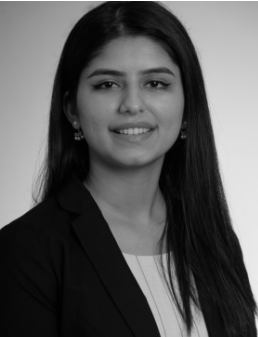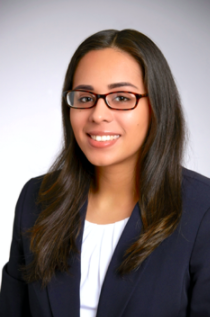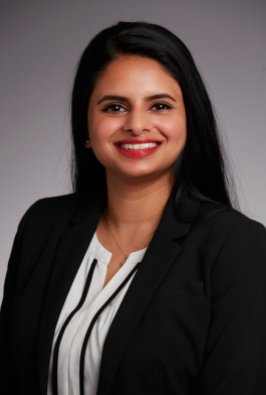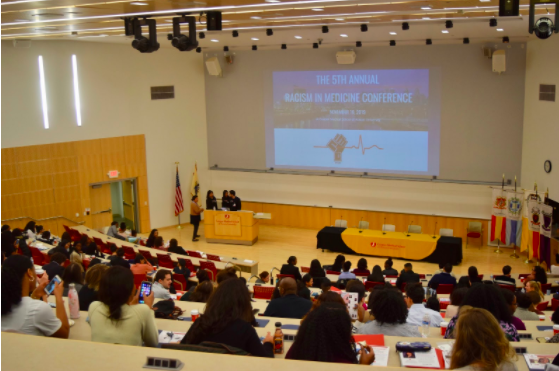The DEI Champion Spotlight features Rowan community members who are leading the way in DEI initiatives across campus. Champions featured in the spotlight serve as a great example of how DEI can be reflected throughout the campus. Meet Cooper Medical School of Rowan University (CMSRU) students who hosted the RiMC (Racism in Medicine) conference in 2019.
Simran Kripalani, Hsiao-Wei Monica Banks, Roberto Gonzalez, Xavier Rivera, Aditi Trivedi, Rasagnya Kota, Victoria Wang, Azmeer Khamisani, Anjali Sivendra, Aditi Ranade, Jenani Nayagan, Claudia Rugama, Youssef Elfatatry, Susan Liu, Myriam Cruz, and Shrina Patel were nominated by a Rowan University faculty member. The faculty member shared, “In 2019, this outstanding group of students at Cooper Medical School of Rowan University (CMSRU) hosted the RiMC (Racism in Medicine) conference. This conference aimed to bring social science scholars, community members, and healthcare professionals to educate students on how systemic racism impacts the health of minority communities and underserved communities. RiMC 2019 consisted of two keynote speakers and sixteen workshops designed to help participants actively recognize and understand how racism and discrimination impact the health of minority communities; as well as identifying and combating racist and discriminatory practices within the medical field. The conference these students created left an indelible imprint on our CMSRU community and provided the seeds of many anti-racism and allyship conversations within the medical school, also providing students and faculty with tools and resources to address racism in medicine and empowering all participants to create actionable change in their communities and institutions.”
Meet Simran Kripalani, Claudia Rugama and Anjali Sivendra, as well as read about their important student DEI initiatives at CMSRU.
Simran Kripalani

Claudia Rugama

Anjali Sivendra

Tell us about yourself:
Simran: My name is Simran Kripalani, and I am a third year medical student at Cooper Medical School of Rowan University. I enjoy singing, painting, drawing, puzzling, and writing. Diversity and inclusion work has always been an integral part of my life. When completing my Bachelor of Science degree at Villanova University, I also pursued a Humanities degree and a Peace & Justice Concentration, which focused on the study of oppression, the roots of violence and war, and theories of justice, and the prospects of peace and peacemaking. Education is an extremely important way to be an advocate and social justice activist, and this helped me facilitate and organize events for my undergraduate institution. This stimulus and desire for positive change was one of many reasons I was co-chair of the 2019 Racism in Medicine Conference.
Claudia: My name is Claudia Rugama and I am a fourth year medical student at Cooper Medical School of Rowan University (CMSRU). I completed my Bachelor of Arts and Science in Biology and Public Health at Rutgers University, New Brunswick. Prior to matriculating to CMSRU, I participated in an internship with the American Heart Association and had the opportunity to oversee the “Healthy Corner Store Initiative” addressing the lack of access to fresh produce by working with local corner store owners in Trenton, NJ. As a medical student, I became involved in several leadership positions for diversity organizations that have provided me more education on health disparities affecting marginalized communities. My passion for diversity and equity largely stems from my own experiences. I was born and raised in Camden, NJ and both of my parents were immigrants from Peru and Nicaragua. My family and I encountered many struggles that included language, cultural and economic barriers as well as facing discrimination. These experiences have fueled my interest in educating myself on the social injustices faced by many people in this country and finding ways to address it. When I learned about the Racism in Medicine Conference, I felt this was an amazing platform to learn, engage, and network with social justice experts and leaders. Everyone recruited in the committees for this conference was enthusiastic and passionate about racism in medicine and brought innovative ideas for the 2019 conference. It was a pleasure working alongside like-minded people who I know will be humanistic and thoughtful healthcare providers in the future.
Anjali: My name is Anjali Sivendra and I am a current third year medical student at Cooper Medical School of Rowan University in Camden, NJ. I have a strong interest in Primary Care medicine especially in underserved areas with a focus on preventive medicine and giving patients the tools and education needed to take their health into their own hands. I was born and raised in New Jersey but my parents immigrated to the US from Sri Lanka almost 30 years ago. That culture and dynamic as a child of immigrants has shaped my upbringing and values in innumerable ways. A major tenet of the culture was a commitment to service, to give whatever you have to lift others up who may not have been as fortunate to be as privileged as you are. As I grew older I realized that service does not just mean tangible acts but also an awareness of the vast disparities that exist in our world and working to draw attention to and change that reality. During my time as medical student I have been involved in organizations and initiatives that work with communities in need to provide extra support and resources that would otherwise not be available such as Camden Prenatal Collaborative, a program that matches medical students acting as health coaches and expecting mothers in the Camden area so that the patients have someone to accompany them to medical appointments and general support during the pregnancy. I was also a board member of Cooper After School Mentorship Program (CAMP) that paired medical students and local Camden youth (middle school and highschool students) to provide academic and social engagement. This is the kind of work that instills a passion in me to advocate for others and fortunately I was able to contribute this passion to the 2019 Racism in Medicine Conference as part of the Executive Student Planning Committee and Public Relations Chair.
Why is DEI Work Important?
Simran: DEI work is not specific to one field or type of person. It is absolutely necessary to understand how discrimination, racism, sexism, ableism, and inequity play a role in the personal and professional societies you are part of. When I become a physician, I will need to understand the history for racism and inequity in medicine to practice as a better provider, serve as an advocate for my patients, and speak out if I see discrimination or bias in the healthcare setting.
Claudia: DEI work is important because racism, sexism, discrimination and inequities are ingrained in our society. Many times, it is often an unconscious bias in which we all participate in practices and behaviors that perpetuate these erroneous ideologies. Through seeking to educate ourselves as well as having honest conversations with our colleagues of various backgrounds, we can manage to work towards achieving equity for all. As future physicians, DEI work is especially important to overcome health disparities. By enhancing our knowledge of people’s background, barriers, culture and beliefs, we can provide better care for all our patients.
Anjali: DEI work is not only important but vital to all fields and professions. The quality of our work and our knowledge are enhanced 10-fold by the diversity of people and thought that we are exposed to on a constant basis. Shedding light on entrenched societal disparities that exist and then putting in the effort to build a platform for marginalized voices is the crux of evolution in our personal and professional lives. We have so much to gain by learning from and working alongside those of all walks of life. Being a medical student essentially means being a lifelong learner, not only of concrete sciences but of different human perspectives and a learned capacity for empathy as well. This is only possible through the intentional and steadfast efforts of DEI organizations and initiatives to bring issues surrounding diversity to the forefront of our consciousness and providing the tools to create solutions.
DEI Resources you would like to share:
Simran: I highly recommend reading “The New Jim Crow” by Michelle Alexander and “Fatal Invention: How Science, Politics, and Big Business Re-create Race in the Twenty-first Century” by Dorothy Roberts. If you are a visual learner, I recommend the documentary “13th” as well as the movie “Just Mercy.”
Claudia: For visual learners like myself, I would recommend “13th” and “I Am Not Your Negro” which are great documentaries on Black history and systemic racism in America. I would also recommend “When They See Us” and “Fruitvale Station”, which both are based on true events and provide perspective to the injustices faced by many Black men and women.
Anjali: During the George Floyd protests and height of the BLM movement in the Summer of 2020 there was an incredible resource that was being circulated throughout social media as a way for allies to consistently and thoughtfully educate themselves on issues of racism and discrimination from the voices of those marginalized themselves. It was a compilation of work including articles, short stories, documentaries, TEDTalks, movies, and more that showed first hand the experience of the Black community that was put in a Calendar format so the user only needed to spend 10-45min a day to actively be informed.
Many thanks to Autumn Gupta and Brynna Wallace for the creation of this resource.

Welcome address and introduction for the 2019 Racism in Medicine Conference Held at Cooper Medical School of Rowan University.